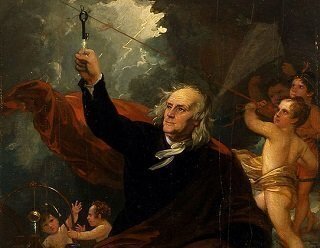In his day, Benjamin Franklin was Steve Jobs, Thomas Edison, Mark Zuckerberg, and Henry Ford, all rolled into one. Here’s a look at his most enduring innovations and inventions on January 17, Franklin 's birthday.
Like the above-mentioned people, Franklin invented his own widely used devices, or found innovative ways to improve on other people’s inventions.
His reputation as a scientist, inventor, author, and statesman extended to Europe, where the French considered Franklin a Renaissance man. The British, after Franklin endorsed revolution against the crown, considered him a dangerous traitor with a price on his head. In his public life of public service, Franklin’s last great contribution came as a quiet but powerful influence at the 1787 Constitutional Convention in Philadelphia.
Of course, Franklin also had his own media empire, and he was a postmaster, politician, firefighter, musician, and expert swimmer, among many things.
Here’s a look at Franklin’s top innovations, most of which are in use today somewhere in the United States.
Invention: The Franklin stove (1742). Previously, fireplaces in Colonial homes were inefficient and smoky. Franklin’s stove gave homeowners a second option. The Franklin Stove, enclosed in iron, provided more heat with much less smoke, using much less wood. Franklin passed on patenting his invention because he thought it was for the greater good.
Invention: The lightning rod (circa 1753). Franklin used his understanding of electricity to develop a cheap solution to keep houses from burning down. The rod diverted electricity from a lightning strike into the ground near a building. They became very popular, and even King George III had one installed at his palace. The lightning rod has since undergone improvements, including a version from Nikola Tesla.
Invention or innovation: Bifocals (date unconfirmed). Historically, Franklin has been credited with inventing bifocals late in his life, as he needed corrective lenses to solve two vision problems. In recent years, there has been a debate about if Franklin was the first to invent bifocals, or if he was an early adopter that made them famous. An analysis from the College of Optometrists details the debate and suggests the technology existed in England in the 1760s, when Franklin was living there. Others believe Franklin invented the devices. Either way, he was the biggest “celebrity” in his day to use them.
Invention or innovation: The flexible catheter (1752). When Franklin’s brother has having problems urinating due to kidney stones, the inventor came up with a practical, less painful solution than the rigid tube that doctors used for patients. The flexible catheter is still used today. There were apparently similar devices in Europe, but Franklin’s was popular in America.
Invention: Key words to describe electricity. Franklin was famous for his experiments with electricity, which also endeared him with the scientific community in France (which helped his later diplomatic career). The late Professor Leo LeMay from the University of Delaware, who was an expert in all things Franklin, credited Franklin with adopting four words we all know today when it comes to electricity: battery, positive, negative, and charge. The words existed before Franklin’s time but had different usage and meanings.
Bonus factoids: Things Franklin didn’t invent. In 1997, LeMay posted a list of things Franklin didn’t invent on the University of Delaware’s website. These things included the first street light, the odometer, daylight savings time, the first volunteer fire company, and the first fire insurance company.








